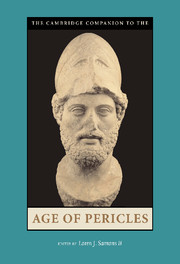Book contents
- Frontmatter
- Introduction: Athenian History and Society in the Age of Pericles
- 1 Democracy and Empire
- 2 Athenian Religion in the Age of Pericles
- 3 The Athenian Economy
- 4 Warfare in Athenian Society
- 5 Art and Architecture
- 6 Other Sorts: Slaves, Foreigners, and Women in Periclean Athens
- 7 Drama and Democracy
- 8 The Bureaucracy of Democracy and Empire
- 9 Plato’s Sophists, Intellectual History after 450, and Sokrates
- 10 Democratic Theory and Practice
- 11 Athens and Sparta and the Coming of the Peloponnesian War
- Conclusion: Pericles and Athens
- Bibliography
- Index
8 - The Bureaucracy of Democracy and Empire
Published online by Cambridge University Press: 28 March 2009
- Frontmatter
- Introduction: Athenian History and Society in the Age of Pericles
- 1 Democracy and Empire
- 2 Athenian Religion in the Age of Pericles
- 3 The Athenian Economy
- 4 Warfare in Athenian Society
- 5 Art and Architecture
- 6 Other Sorts: Slaves, Foreigners, and Women in Periclean Athens
- 7 Drama and Democracy
- 8 The Bureaucracy of Democracy and Empire
- 9 Plato’s Sophists, Intellectual History after 450, and Sokrates
- 10 Democratic Theory and Practice
- 11 Athens and Sparta and the Coming of the Peloponnesian War
- Conclusion: Pericles and Athens
- Bibliography
- Index
Summary
Sometime in the second half of the fifth century the Athenians ratified a decree, proposed by a citizen named Kleinias, setting out stricter regulations for the collection and delivery of tribute to Athens (IG i3 34). Although the decree cannot be dated precisely (suggested dates range from ca. 448 to ca. 424), its provisions provide important insights into Athenian imperial administration. They also testify to the official, administrative role that written texts played in fifth-century Athens. The decree requires subject cities to send to Athens, together with tribute payments, sealed tablets recording the amounts they are sending (lines 6-16). These tablets are to be opened at Athens and read out to the boule as payments are delivered (lines 16-18). Further texts are created at Athens itself. The hellenotamiai are instructed to report to the assembly which cities have paid their tribute in full, and which cities have not (lines 18-22). Then a commission of four men is to draw up a written list of the names of defaulting cities, copying that information from the earlier report (also presumably written) of the hellenotamiai (lines 22-8). This written list of cities in arrears will serve as the foundation of the commissioners' work: their principal task is to collect balances of unpaid tribute from delinquent cities.
The contents of later sections of the decree are less certain, because the stone on which its text is preserved is fragmentary. But they too allude to documents, some of which concern legal proceedings. Some clauses appear to outline procedures against individuals interfering with the efficient delivery of tribute; such persons are to be liable to graphai, written indictments, lodged with the prytaneis (lines 31–41).
- Type
- Chapter
- Information
- The Cambridge Companion to the Age of Pericles , pp. 196 - 214Publisher: Cambridge University PressPrint publication year: 2007
- 2
- Cited by

